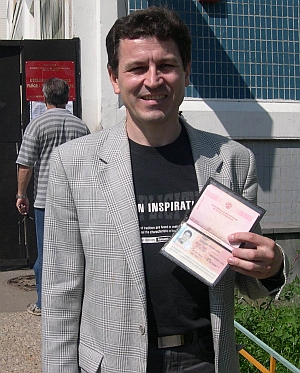
Arctic Frontiers: Disinformation, Security and the Northern Sea Route
Bellona held a seminar on countering Russian disinformation in the Arctic at the Arctic Frontiers international conference in Norway
News

Publish date: July 2, 2004
Written by: Vladislav Nikifоrov
News
On June 30, Grigory Pasko received a telephone call on his mobile phone from the director of the local passport department who asked the journalist: Why dont you, Grigory Mikhaylovich, pick up your international passport, its been here for a long!.How long? asked Pasko. Whole day already the director said.
Pasko filed all the necessary documents for an international passport back in April last year, and anticipating it would be ready within the legal time frame of one month, he was preparing to visit Bellonas central office in Oslowhich organized his defence at his last trialat the beginning of May.
But it was not until July 8, 2003,four months after he filed his applicationthat Pasko received official notice that his request had been turned down by office No. 3 of the Visas and Registration Department of Moscows South-Eastern District, a local branch of Russian police-controlled international passport and immigration authority known by its Russian acronym as OVIR.
Later Grigory appealed this decision in the Moscows Lyublino District Court which rejected the appeal.
According to Paskos lawyer, Ivan Pavlov, OVIR based its decision not to issue the international passport on some order of 1998, signed by the chief of one of Moscow’s police precincts. The order stated that release on parole is not a complete release from the sentence. A person’s rights can only be limited by law, not by an order by some minor bureaucrat, who in this case is not even a minister and not even the head of the Moscow police. The order is not a normative act and is unacceptable in this case, said Pavlov. According to Article 79 of the Russian Criminal Code, release on parole is one the types of release from punishment, therefore it cannot limit the right to travel outside the Russian Federation.
On August 20, 2003, the Moscow City Court upheld the ruling of a lower district court which one month before had denied the appeal of prominent environmental journalist and whistleblower Grigory Pasko to have his international passport reinstated.
The long-lasting fight for Grigory Paskos right for international passport is over. This is a small but very useful victory for all environmental and human rights movement in Russia.

Bellona held a seminar on countering Russian disinformation in the Arctic at the Arctic Frontiers international conference in Norway

Our December Nuclear Digest, reported by Bellona’s Environmental Transparency Center, is out now. Here’s a quick taste of three nuclear issues arisin...

Bellona has launched the Oslofjord Kelp Park, a pilot kelp cultivation facility outside Slemmestad, about 30 kilometers southwest of Oslo, aimed at r...

Our November Nuclear Digest by Bellona’s Environmental Transparency Center is out now. Here’s a quick taste of just three nuclear issues arising in U...